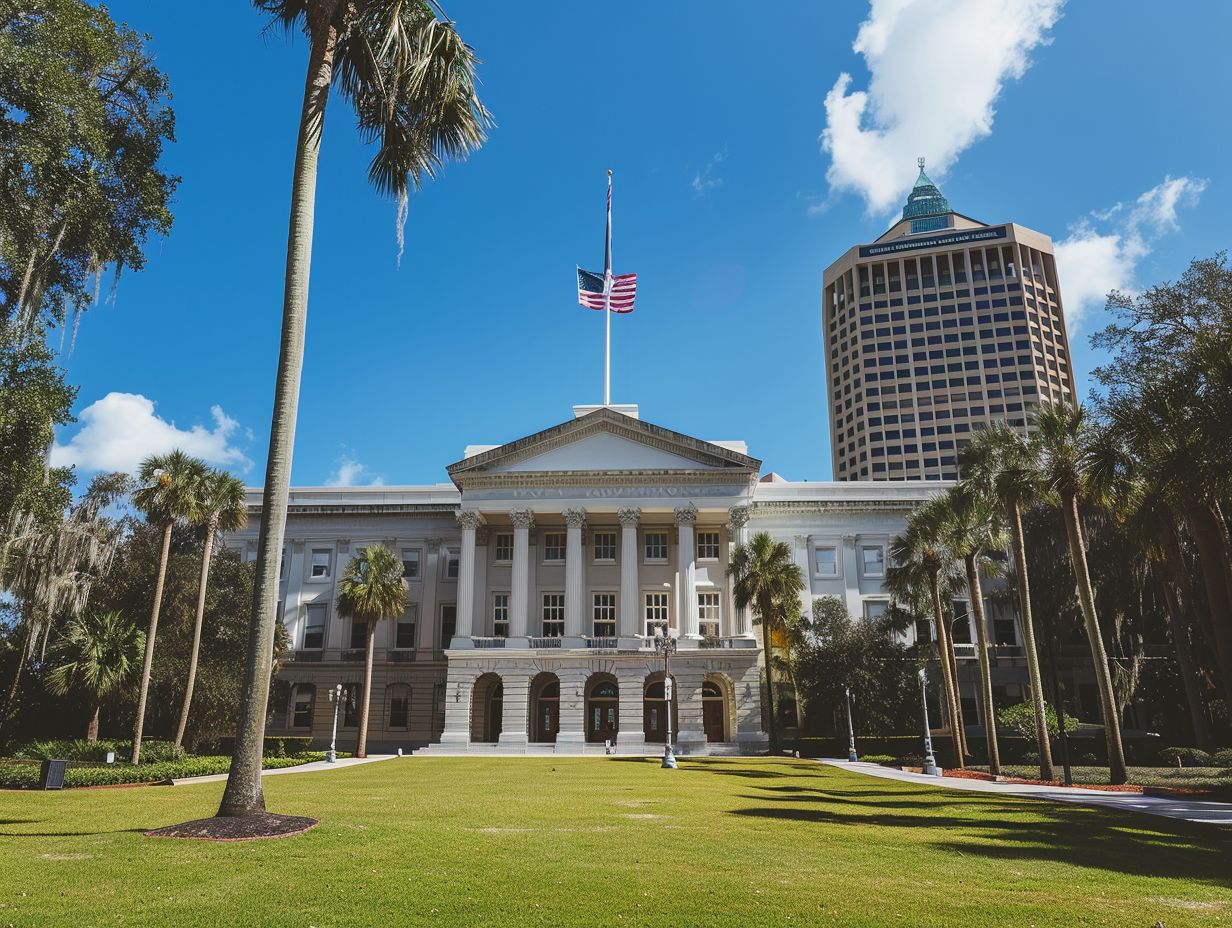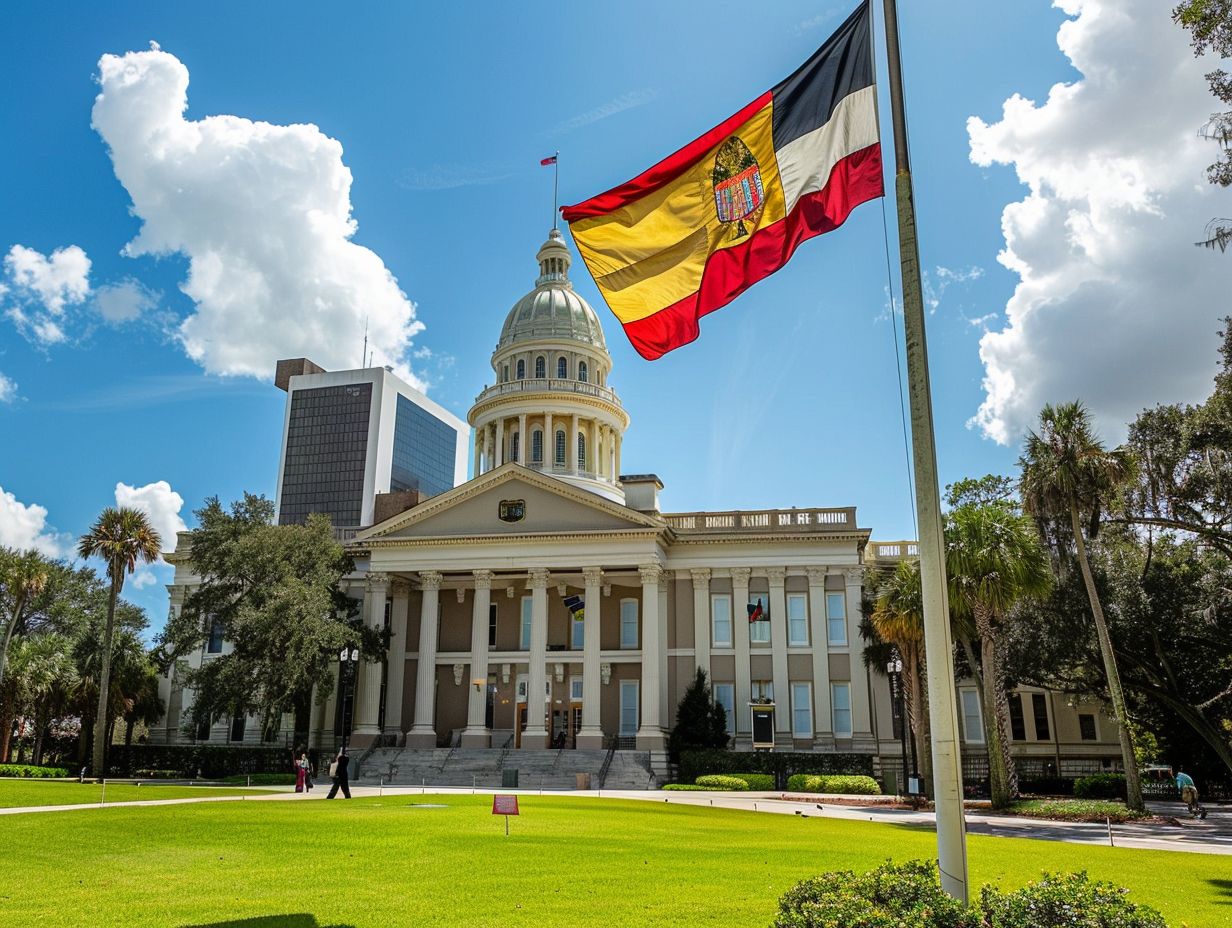Are you curious about how laws are made in Florida? Understanding the state’s legislative process can seem like a daunting task, but it doesn’t have to be.
In this article, we will break down the key players involved, the steps in the process, and how you can stay informed and get involved.
From the Governor to lobbyists, citizens, and advocacy groups, each plays a crucial role in shaping Florida’s laws. Let’s dive in and explore how you can navigate Florida’s legislative process.
Key Takeaways:

- Understand the roles of key players, including the Governor, Florida Legislature, lobbyists, and citizens, in the legislative process.
- Know the steps in the legislative process, such as bill introduction, committee review, floor debate and vote, conference committee, and the Governor’s approval or veto.
- Stay informed by following legislative news sources, attending committee meetings and floor sessions, contacting legislators, and joining advocacy groups.
What Is the Florida Legislative Process?
The Florida legislative process is a multi-step procedure that follows guidelines set by the Florida Constitution and Florida Statutes. It involves actions and reviews by different legislative bodies, including the Florida Legislature and committees, and ultimately requires approval from the Governor to become law.
Who Are the Key Players in the Florida Legislative Process?
Key participants in the Florida legislative process comprise the Governor, members of the Florida Legislature like Senators and Representatives, committee members, the Speaker of the House of Representatives, the President of the Senate, lobbyists, and involved citizens, all of whom hold vital roles in influencing and passing legislation.
1. The Governor
The Governor of Florida holds a significant role in the legislative process by reviewing bills passed by the Florida Legislature and deciding whether to sign them into law or veto them. When the Governor opts to veto a bill, it signifies a rejection of the proposed legislation, preventing it from being enacted.
This veto authority acts as a critical means of checks and balances on the decisions made by the Legislature, enabling the Governor to block laws they deem not in the state’s best interests.
The Legislature has the option to try to override a gubernatorial veto by achieving a two-thirds majority vote in both chambers. This veto override process illustrates the intricate power dynamics between the executive and legislative branches in Florida, underscoring the significance of negotiation and compromise in the legislative process.
2. The Florida Legislature
The legislative process in Florida is overseen by the Florida Legislature, which is made up of the House of Representatives and the Senate. This legislative body is responsible for introducing, reviewing, and passing bills that impact the state.
The Speaker of the House and the President of the Senate hold key positions within the Florida Legislature. The Speaker leads the House, while the President oversees the Senate. Both chambers of the Legislature have legislators who propose new laws by drafting bills.
These bills undergo multiple readings and committee reviews. Committees are instrumental in shaping legislation by holding hearings, debating bill provisions, and providing recommendations for amendments.
After a bill successfully navigates through the committee process, it moves on to floor debates and a final vote in each chamber. If the bill passes both chambers, it then proceeds to the governor for approval or veto.
3. Lobbyists
Lobbyists are key participants in the Florida legislative process, representing specific legislation or amendments for different interest groups and entities. They have an essential role in shaping legislation by offering lawmakers valuable insights, research, and data on intricate issues.
Lobbyists use different tactics to sway legislators, like setting up meetings, creating persuasive materials, and giving campaign contributions. Ethical concerns and regulations oversee lobbying activities to promote transparency and avoid inappropriate influence.
The influence of lobbying on the legislative process can be substantial, as it can facilitate communication between policymakers and stakeholders, leading to well-knowledge-based decision making.
4. Citizens
Individuals play a crucial role in the Florida legislative process by engaging in public hearings, reaching out to their legislators, and advocating for or against specific bills and policies. Engagement in the legislative process is essential to ensure that the voices of the people are taken into account by decision-makers.
Attending committee meetings allows individuals to witness discussions firsthand and gain insights into the legislative process. Providing testimony gives people the chance to share personal experiences and expertise, influencing the decision-making process.
Using communication channels like writing letters, making phone calls, or interacting on social media can help constituents establish relationships with their representatives and effectively communicate their concerns.
What Are the Steps in the Florida Legislative Process?
The Florida legislative process includes various key steps, beginning with the introduction of a bill. This is followed by committee review, floor debate, and voting in both the Senate and the House of Representatives, ending with the Governor’s decision to approve or veto the bill.
1. Committee Review
After a bill is introduced, it is usually referred to a relevant committee, which can be a standing committee or a select committee, for examination to assess its merits and implications.
The committee review process is a critical stage in determining the fate of a bill. It involves conducting public hearings to gather feedback from stakeholders and the general public, which offers valuable insights into the potential consequences of the proposed legislation.
Expert testimony is frequently requested to provide specialized knowledge and analysis on the subject matter, aiding committee members in making well-informed decisions.
During committee debates, various perspectives are taken into account, facilitating a comprehensive evaluation of all aspects of the bill. Standing committees, which focus on specific policy areas, are permanent bodies, whereas select committees are established for temporary purposes, such as investigating specific issues.
Both types of committees have distinct roles in the legislative process, with standing committees responsible for ongoing oversight and select committees addressing particular concerns or tasks.
2. Floor Debate and Vote
After successfully passing the committee review, the bill progresses to the floor of the respective chamber for debate and a vote by the full membership.
During floor debates, members are given the opportunity to present their arguments either in favor or against the bill, offering insights into its potential impact. The rules that govern these discussions guarantee that each member has an equal opportunity to express their views while upholding decorum and order.
Following the debate, a voting process takes place where members submit their votes, determining the fate of the bill. In order for a bill to move forward, it must secure a majority vote in both the Senate and the House of Representatives. This stage ensures that the bill garners adequate support across both chambers before proceeding to the next phase of the legislative process.
3. Conference Committee
When the Senate and House of Representatives pass differing versions of a bill, a conference committee is established to reconcile the variances and create a consistent bill for approval.
This committee typically comprises senior members from both chambers who are responsible for negotiating the differences in the bills. They convene to address key points of disagreement and strive to reach a compromise that satisfies all parties involved. The committee plays a fundamental role in streamlining the legislative process and ensuring that a unified piece of legislation is presented for final approval.
Once an agreement is reached, the committee drafts a final iteration of the bill, merging elements from both versions to produce a coherent document that can be voted on by both chambers.
4. Governor’s Approval or Veto
Once both chambers pass the identical bill, it is sent to the Governor for approval. The Governor may sign it into law or exercise a veto to reject it.
When evaluating a bill, the Governor considers various factors such as legal implications, public opinion, and alignment with their policy priorities. If the Governor decides to sign the bill, it becomes law and is enacted. If the Governor chooses to veto the bill, it is sent back to the Legislature with an explanation.
In such a scenario, the Legislature can override the Governor’s veto by mustering a certain majority vote in both chambers, essentially bypassing the Governor’s decision. Once the enrolled bill is signed or the veto is overridden, it officially becomes law.
How Can You Stay Informed about the Florida Legislative Process?
Remaining knowledgeable about the Florida legislative process is crucial for engaging effectively in civic matters. There are various methods to stay updated on the most recent developments, such as:
- Following legislative news sources
- Attending committee meetings and floor sessions
- Reaching out to your legislators
- Becoming a member of advocacy groups
1. Follow Legislative News Sources
One of the primary methods to remain updated on the latest bills, committee actions, and legislative sessions in Florida is by following reputable legislative news sources.
These sources offer valuable insights into the decision-making processes and policy changes that impact the lives of Florida residents. For reliable and extensive coverage of the Florida legislative process, individuals may consider exploring websites such as ‘Tallahassee Democrat’, ‘Florida Politics’, and ‘The Florida Channel’.
Staying informed through these sources provides individuals with the knowledge necessary to engage meaningfully in discussions, advocacy efforts, and participation in civic matters. By keeping up with legislative developments, citizens can actively participate in shaping the future of their state.
2. Attend Committee Meetings and Floor Sessions
Attending committee meetings and floor sessions in person or virtually provides an opportunity to observe the legislative process and understand the discussions and decisions being made.
Accessing these sessions allows individuals to gain firsthand insight into how laws are crafted and debated. Virtual options enable participation and engagement from the comfort of one’s own home, increasing accessibility for those unable to attend physically. Observing these meetings allows the public to witness democracy in action and enhances transparency in government processes.
Public participation offers a valuable opportunity to voice concerns, share perspectives, and contribute to shaping policies that directly impact communities.
3. Contact Your Legislators
Reaching out to legislators is a direct method to express opinions, seek clarification, and influence the legislative process by engaging with elected representatives.
When contacting legislators, it is essential to maintain clarity and brevity in communication. Whether through letters, emails, or phone calls, clearly express your stance on the issue and provide reasons for its significance.
It is important to maintain respect, even in cases of disagreement. Offering specific details, such as the potential impact of a particular bill on the community or sharing personal anecdotes, can help emphasize the importance of your perspective. Additionally, following up after initial contact can help sustain engagement in the dialogue.
4. Join Advocacy Groups
Joining advocacy groups can enhance one’s voice in the legislative process by collaborating with others who share similar goals and working together to influence policy decisions.
Advocacy groups like the American Civil Liberties Union (ACLU), Greenpeace, and the National Association for the Advancement of Colored People (NAACP) play essential roles in the legislative process by conducting research, drafting policy proposals, and mobilizing public support.
By becoming a member of these groups, individuals can contribute to a collective effort that has a more substantial impact on shaping laws and regulations.
Getting involved can be as straightforward as signing petitions, contacting elected officials, attending rallies, or participating in advocacy campaigns. The power of organized advocacy lies in its capacity to bring together individuals with diverse backgrounds and perspectives toward a common cause, ultimately influencing positive legislative outcomes.
Frequently Asked Questions
1. What is the purpose of the Florida Legislative Process?
The purpose of the Florida Legislative Process is to create, debate, and pass laws that govern the state of Florida. This process involves multiple steps and branches of government to ensure fair and effective legislation.
2. Who can participate in the Florida Legislative Process?
Any citizen of Florida can participate in the legislative process by contacting their elected representatives, attending public hearings and meetings, and providing input and feedback on proposed legislation.
3. How does a bill become a law in Florida?
In order for a bill to become a law in Florida, it must go through several stages including introduction, committee review, debate and voting, and finally, approval by the governor. The process is designed to be thorough and transparent, allowing for input from various stakeholders.
4. What is the role of the Florida Legislature?
The Florida Legislature is responsible for creating and passing laws, approving the state budget, and overseeing the actions of the executive branch. It is made up of the House of Representatives and the Senate, which work together to ensure the needs of the state and its citizens are met.
5. How can I track the progress of a bill in the Florida Legislative Process?
You can track the progress of a bill by visiting the Florida Senate and House of Representatives websites, which provide up-to-date information on the status of all bills. You can also sign up for email alerts or contact your local representatives for updates.
6. What can I do if I disagree with a proposed law in the Florida Legislative Process?
If you disagree with a proposed law, you can voice your concerns to your elected representatives, attend public hearings and meetings, and participate in the legislative process. You can also join advocacy groups and share your views with other citizens to raise awareness and potentially influence the outcome of the legislation.


























Rate this article:
Average rating 0 / 5. Vote count: 0
No votes so far! Be the first to rate this post.
No Comments yet!